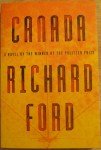Reading along with Richard Ford
 Fascinating Q&A with novelist Richard Ford in the “Books” section of the Boston Globe over the weekend. I was mesmerized by his latest novel Canada, which I blogged about several times (1, 2, and 3) while caught up in the reading of it last May and June. These are two of the most interesting bits from Ford’s discussion with Amy Sutherland:
Fascinating Q&A with novelist Richard Ford in the “Books” section of the Boston Globe over the weekend. I was mesmerized by his latest novel Canada, which I blogged about several times (1, 2, and 3) while caught up in the reading of it last May and June. These are two of the most interesting bits from Ford’s discussion with Amy Sutherland:
BOOKS: Are you a slow or fast reader?
FORD: Slow. I’m dyslexic. If you can reconcile yourself to not being able to burn through books, which you shouldn’t any way, you can slow the whole process down. Then, because of my disability, there is more for me in imaginative literature than there is for other people. . .
BOOKS: What was your reading like before this?
FORD: Dutiful. Remember when you were kid in school and the teacher was always telling you there’s more here than you see. There’s a line of Henry Moore’s, “Never think of the surface except as an extension of a volume.” I was thinking there was a volume but where the hell was it?

